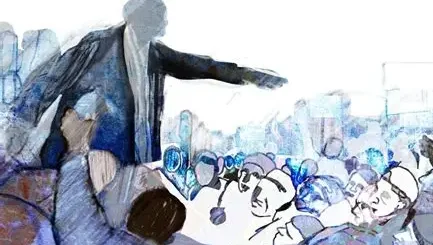Democracy Through the Lens of the Shadow Mind

Oct. 12, 2025 • Maria Therese Syriac
Reading ‘Swaraj in Ideas’ completely changed how I think about democracy. The idea that hit me hardest was the “shadow mind”, when people who’ve been colonised can go through the motions of thinking but miss the real depth, the connection to their roots, and the ability to come up with truly original ideas. This made me wonder: Are we really thinking about democracy with our minds, or are we just repeating ideas from somewhere else in a language that isn’t really ours?
I used to think democracy was simply good, something modern and universal that everyone should want. But this book showed me that democracy, like any political idea, isn’t set in stone. It changes based on history, who has power, and how people understand it. What really bothered me was thinking that maybe we know democracy through ways of thinking that aren’t actually ours. Perhaps we’re working with a kind of fake democracy that comes from institutional rules handed down to us, not from our own authentic experience of what it means to participate in governing ourselves.
The essay on “Redescribing Democracy” talks about how modern theories have turned democracy into just a way to measure if the government is working well, caring more about results than whether people actually get to participate. But after reading ‘Swaraj in Ideas,’ I think even this way of measuring might be something we borrowed from the West, something that fits with Western ideas about efficiency and being professional, but doesn’t really match how we actually live and do politics.
According to ‘Swaraj in Ideas,’ the tragedy of the shadow mind is that it can talk about things but can’t create anything new. Sometimes our talk about democracy feels exactly like this, bright but disconnected, lively in words but dead in feeling. We use all this language about rights and representation and liberalism, but we rarely do the hard work of connecting it to our social reality and history. This creates a massive gap between ordinary people and the educated people and institutions that claim to speak for democracy.
What struck me most is that we’ve probably accepted democracy as a universal good without first doing the hard work of translating it into our way of thinking and speaking, really making it ours. Just like the author of ‘Swaraj in Ideas’ warns against just copying Western ideas, I can see much more clearly now that we might be acting out democracy instead of actually living it.
We talk about participation, but do we have ways to describe what participation means to us in our languages and traditions? Or can we only talk about it in English using Western philosophical ideas? Are we figuring out what democratic values mean from within our own culture and society, or are we just putting on a foreign model and then judging ourselves by it?
This leads to an even deeper question: Can democracy in India (or any country that was colonised) ever really work until we first have freedom of ideas? Suppose we don’t free our minds from what one writer calls the “nervous twitch” of always depending on others intellectually. Can we ever have real participatory democracy, one that’s participatory not just in how it looks but in its very spirit?
We need to get back to thinking with our real minds, the part of us that can think original, deep thoughts that come from our own culture. Only then can democracy stop being something we borrowed and become something alive that genuinely represents who we are as people.
The idea of making democracy dynamic, as suggested in “Redescribing Democracy,” is both something we need psychologically and politically. Democracy needs to be seen as something we do, not just a system we have. But instead of acting from these borrowed, shadow versions we inherited, we need to act from our authentic thinking.
I feel humbled because I now see how deeply colonisation can twist even our highest ideals. But I’m also inspired by what’s possible: going back to conscious engagement, turning foreign ideas into our own, and most importantly, rediscovering our ability to think for ourselves.
This isn’t just about politics, it’s about reclaiming our minds and our right to think our thoughts about how we want to live together.